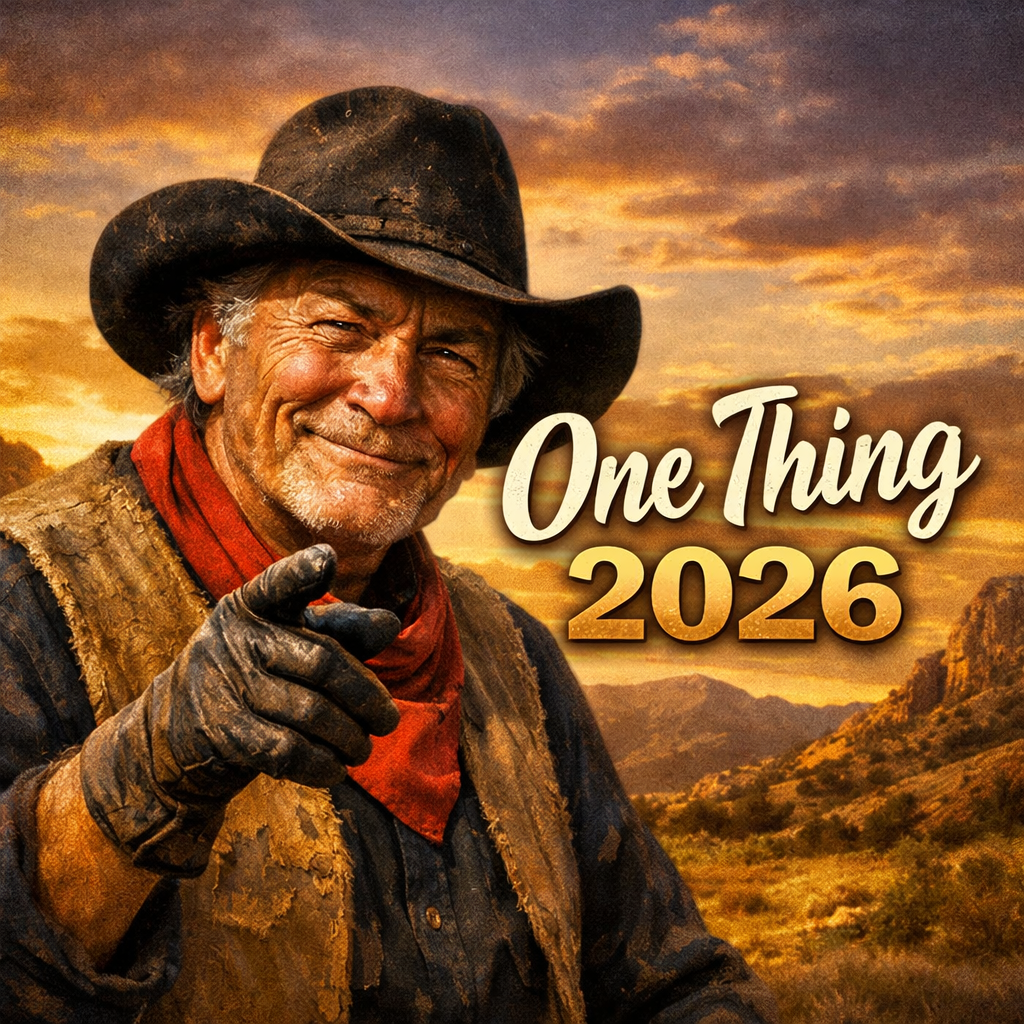Ron’s Questions: Segment One
Welcome to The Soul of Enterprise: Business in the Knowledge Economy, sponsored by sage, transforming the way people think and work so that organizations can thrive. I'm Ron Baker, along with my good friend and VeraSage Institute colleague Ed Kless. On today's show, folks, we have for the third time, Joe Woodard. Hey, Ed, how's it going?
Ed
If I were any better, it would be illegal.
Ron
Okay, good. Well, I'm looking forward to this conversation. Let me read Joe in here, as if people don't know him, but just real quick. Joe Woodard is an author, consultant, business coach, and national speaker. He's trained over 100,000 accounting and business professionals. He's been on the Accounting Today’s Top 100 Influential people in the profession for many years, and he is the CEO of Woodard events, which includes education, coaching resources, and a community for small business advisors and small business owners within the accounting industry. I love his vision: “To transform small businesses through small business advisors.” Joe Woodard, welcome back to The Soul of Enterprise.
You were here in December 2016 [Episode #119], and in September 2019 [Episode #258]. We had a little thing in the interim since we last met Joe, called COVID. What lessons did we learn?
I think it drove home the point for me that this, at the end of the day, is a relationship business. And you know, the tech stacks we talk about, and the transition to advisory, and all of that, at the end of the day, it is about belly button to belly button. And we're just like healthcare workers, we're on the front lines.
Something we have talked about with other guests on the show, if you spun back to 2010, or 2000, with COVID, I don't think many businesses would have been able to handle it very well without all the amenities we have today with the internet and everything. So what innovations have you seen from firms? I mean, we talked about the switch to the cloud and firms said, “Oh, this could never happen.” Obviously, remote work became a thing. And we're very interested here in the Results Only Work Environment [ROWE]. Have you seen other innovations come from firms during the past year-and-a half or so?
Have you seen more and more firms adopt a value pricing model out of this COVID pandemic?
That's wonderful, because that gives them capacity. And we've always argued that you should put capacity before revenue. Unfortunately, we find most firms do the opposite. They won't hire somebody until they're busting at the seams.
I love it. Last time we had you on, Joe, you said you changed your mind, I think it was before we went live, on two topics. And one of them was on timesheets. I'm just curious, in the training of these 1,000 firms or so in value pricing, what do you tell them about the timesheet and their measurements?
I love it because the timesheet has no granular information like that. And you're only able to get those insights because you were looking at how work flowed through the organization. Anyway, Joe, this is great, it’s flying by.
Ed’s Questions: Segment Two
We are talking today on The Soul of Enterprise with Joe Woodard. Joe, you and Ron having that love fest to the accounting profession. Now, I want to ask you, so what did they miss during COVID? What did they get wrong? What should they have done in addition to all that?
Well, one thing I think they did miss—and we're starting to see reverberations of this right now as we begin to come out of COVID, and last reports that I've read, there's some really good signs that we're starting to see that this last jump is starting to go back down, so maybe we're really coming around where we were maybe late June, early July—was the Great Resignation. I talked to one firm leader who had 17 people during COVID, and in the last two months 10 of them have left, 10 out of 17. Now, he's probably an outlier. But we're hearing stories, especially among some of the mid-size firms, that this is really a big problem. And I have my ideas as to what might be causing it, but I'd be curious as to your thoughts on it, and what you're seeing too, maybe in the smaller firms that you work with it's not so much of an issue?
You just don't want them to move to California so they have Nexus in California, that would probably be a bad idea, Joe.
See, I'm trying to get Baker to move to Texas for years now. But picking up on that, you said two things that reminded me of some previous guests. One is Jody Thompson, her great line is that work is a thing you do, not a place you go. And I think that’s critically important. I would agree with you that the purpose was part of it, because I think that part of the whole Great Resignation across the board was really pent-up demand. In other words, people didn't leave their job and then all of a sudden, boom, now we have the opportunity to do so. The attrition that would have happened normally over time, but I agree the reason why Disney didn't fall prey to that, and probably Southwest Airlines and The Container Store and all of these other places, is because they are purpose driven. That was a great story. Our saying on that is we want you to be efficient with things but effective with people. And what that woman was clearly being effective with that child to make sure that he understood. So, Joe, there's a lot of things going on right now with regard to the accounting profession where more and more companies are virtually abandoning their entire accounting department, and businesses that are in growth stages going through the transition of small to medium are not hiring people in accounting but instead going to CAS services right, client advisory services, as well as just outsourced bookkeeping. We've got only like about a minute or two left before our break, but I think this is a huge trend. I can truly see that five to ten years from now there are going to be very few companies that have anyone in their accounting department at all. Thoughts on that?
I couldn't agree more, and certainly this guy Jeff Bezos putting $400 million into a company called Pilot, so now the bookkeeping profession is also competing with, I don't know, Amazon, effectively. Maybe this will get someone's attention, but alright Joe, this is flying by, as Ron says.
Ron’s Questions: Segment Three
Welcome back, everybody. We're here for the third time with one of our most popular guests, Joe Woodard. Joe, I have to ask you, I saw I think you did a webinar, maybe it was this week, on the backseat driver client. I just have to ask you, what is that?
I was going to bring up that Starbucks story, so thanks for telling that story. I love that story. Have accountants gotten better with that?
Let me ask you this, Joe. We've been talking a lot for the last two-and-a-half years about the subscription economy. Ed and I are big believers that the customers of accounting firms should subscribe to the firm. We spent the whole first segment talking about the relationship. But let's face it, when you look at the business model, we don't monetize the relationship, we monetize the transactions. And I think that's a deep flaw. I want to move the accounting profession over to what concierge medicine, or Direct Primary Care medicine, where you subscribe to a general physician, and they handle anything you need, that they're capable of doing. And that's a big caveat—if you need a specialist, they'll get you that—but you’re covered for whatever they're capable of doing within their four walls, and it's inclusive in one price. Now, you could still have options and all of that. But what's your reaction to that?
I love that because that's really leveraging the social capital that all firms have. But it's the least leveraged of the three types of intellectual capital that we talk about. I've got to ask you, Joe, you did a reality TV show [called Tech Makeover], tell us about it.
Wow, that sounds awesome. I'm going to have to check that out. We will definitely link to that in the show notes. Real quick, what books have you read since we last spoke that have really impacted you?
Joe Woodard
Well, I was a little late to the party on it, but I finally got around to Measure What Matters to Customers [Ron’s book] finally, can you believe it? But it impacted me so significantly that it's revolutionized the way we run our business here, with the objectives and key results. We were big on KPIs, and we had really good predictive analytics, we were really good on financial measurements, but we weren't connecting, what we found is between purpose, which is the daily what you do, and vision, which is the magnetic north Compass Point. In between those two things, measurement must take place that is aligned with purpose and aligned with vision. And the key results are more connected to the purpose, the daily grind, the objective is more connected to the vision. And it was the missing bridge between our purpose and our vision. The second book, and I know that we're tight here for the next break, but the second one that really made a difference for me was The Advantage, by Patrick Lencioni. Particularly, his section in that book on company values, and the distinction between core and operational and aspirational values made a huge difference in our business.
Ron
That's awesome. Well, Joe, thank you so much. I'm going to let Ed take you all the way home but I just want to say thanks again for appearing on The Soul Enterprise for the third time.
Ed’s Questions: Segment Four
Finishing up our conversation, our third conversation, with Joe Woodard, Joe, I want to take a macro approach here to this last segment, and just get your thoughts on something that's concerning to me. I see a lot of the new regulations that are coming down from governments all over the place, statewide and also federal. And I think it's potentially starting to have an impact on the creation of new businesses and entrepreneurs really being able to create without permission in some ways. I know you do a lot of reading, are erudite on a lot of a lot of different subjects. Is this something that you're concerned with or have been thinking about as well?
I have a feeling that we're going to see a lot of companies that are 99 and fewer emerge out of what's going on with COVID regulation. At the same time, though, the challenge that I see is that states like California are making it harder and harder to really be classified as gig workers. And they're insisting that Uber and Lyft and all this pay their people as employees when they're really not.
Well, we've got about three or four minutes left. What are you working on?
Amen. We'll just give that an Amen, and we'll wrap it up from there. Joe Woodard, thanks so much for being on The Soul of Enterprise, we really appreciate it. Ron, what do we have coming up next week.
Ron
Next week, we have Kimberlee Josephson. She is the Associate Professor of Business Administration at Lebanon Valley College. I'm sure we'll talk to her about ESG and things that you were asking Joe about with these regulations, she writes for FEE [Foundation for Economic Education] so looking forward to that.
Ed
All right, outstanding, I'll see you in 167 hours.
Bonus Content is Available As Well
Did you know that each week after our live show, Ron and Ed take to the microphone for a bonus show? Typically, this bonus show is an extension of the live show topic (sometimes even with the same guest) and a few other pieces of news, current events, or things that have caught our attention.
This pas week was bonus episode 359 - ABCs - Apple, Bees, and China. Here are a few links discussed:
Hundreds Of Dead Migratory Birds In New York City Prompt Calls For Dimming Lights : NPR
Household net worth rises above $141 trillion, but debt up sharply as well
China declares all crypto-currency transactions illegal - BBC News
Click the “FANATIC” image to learn more about pricing and member benefits.










